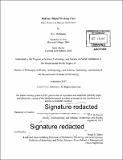Making a digital working class : Uber drivers in Boston, 2016-2017
Author(s)
Robinson, H. C. (Hilary C.)
DownloadFull printable version (13.89Mb)
Alternative title
Uber drivers in Boston, 2016-2017
Other Contributors
Massachusetts Institute of Technology. Program in Science, Technology and Society.
Advisor
Susan S. Silbey.
Terms of use
Metadata
Show full item recordAbstract
Pocket computers, called "smartphones," have become a part of everyday life over the past decade. Most people now routinely carry around with them millions of times more computing power than generated the Apollo mission to the Moon. They use it to access, process, and share information quickly and cheaply, in furtherance of the things people have long done: buying and selling, socializing, and so on, yet faster and across greater distances-characteristic of what we call "modernity." This has affected the ways in which people are working, and who is working, doing what, today. This thesis reports the results of a field study of one new kind of laborer who has been brought into work consequent to the smartphone: Uber drivers. The author conducted ethnographic fieldwork over one year in Boston, Massachusetts, and the surrounding area using ride-along sampling, participant observation, lengthy interviewing, and systematic coding in order to better understand a software-organized, person-to-person labor market in which the person who does the labor also brings the capital in the form of a vehicle used to provide transportation to other people. The first chapter of the thesis provides a typology of Uber drivers based on semi-random sampling through ride-alongs. The second chapter describes collective action that was undertaken by Uber drivers at Boston's Logan Airport in the form of a strike against the algorithm, which was an effort to induce the software to perceive an (artificial) driver shortage, leading to an increase in the price of fares. The third chapter offers a theory of the structure of Uber as an organization that mobilizes labor by using software to facilitate economic transactions that are triangulated between two users and the firm. The chapter also explains how this structure was particularly apt at mobilizing large numbers of people to carry out "regulatory breach," as they worked as Uber drivers doing the equivalent of taxi or livery work without complying with any of the applicable legal regulations. The final chapter explains how analysis of the field data, in combination with the new theoretical insights of the thesis, drives a conclusion suggested by the thesis title: that Uber has made a digital working class.
Description
Thesis: Ph. D. in History, Anthropology, and Science, Technology and Society (HASTS), Massachusetts Institute of Technology, Program in Science, Technology and Society, 2017. Cataloged from PDF version of thesis. Includes bibliographical references (pages 216-226).
Date issued
2017Department
Massachusetts Institute of Technology. Program in Science, Technology and SocietyPublisher
Massachusetts Institute of Technology
Keywords
Program in Science, Technology and Society.